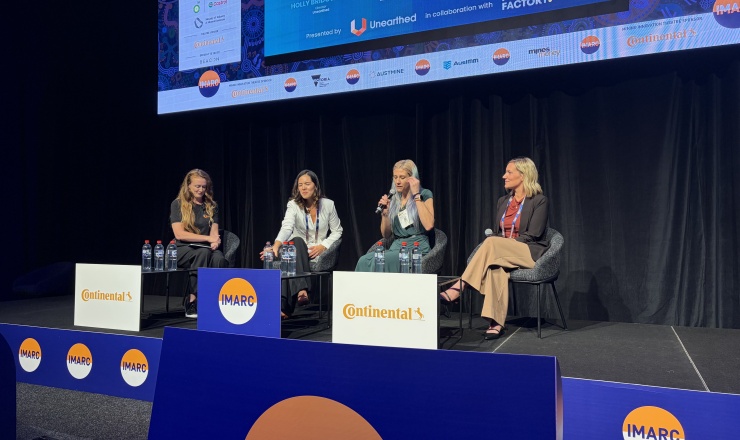
Funding the Future of Mining Tech at IMARC 2025
Hosted by Unearthed in collaboration with Founders Factory , our session “Funding the Future of Mining Tech” brought together a
Read articleThis article reflects Unearthed's early work with hackathons.
Today, Unearthed operates as an open innovation partner to the mining and resources sector. We run open innovation challenges, conduct global technology scouting, and help companies connect with deployable solutions to real operational problems.
Hackathons were a starting point. Industry impact is the focus now.
Read about Newcrest Mining's commitment to open innovation to gather new insights and uncover unconventional opportunities through the Unearthed Hackathon events in the Australian Financial Review article.
See the full article on the Australian Financial Review here.
It tended to happen when least expected by the workers at Australia's most profitable gold mine.
The conveyor belt carrying the copper and gold ore out of the mine's massive grinding mill would suddenly be flooded with material, risking losses and slowing production. The worst part for the Newcrest Mining employees at the Cadia mine in New South Wales was they didn't know why it was happening.
"The trouble was we didn't know what the factors were that would lead to these events," said Newcrest chief Sandeep Biswas, describing the issue recently. The consulting industry would have jumped at the chance to advise a big corporate like Newcrest on the cause of these surge events, but the gold miner chose instead to seek counsel from an unconventional place; a "hackathon".
Staring at a laptop for 50 hours isn't everyone's idea of a good weekend, but for data scientists and programmers it's an unmissable opportunity.
"Any access to real industry data is like the golden source, they love that stuff," says Mikey Kailis, from hackathon organiser Unearthed.
Hackathons seek out companies that are willing to share a problem, and then attract a group of hackers who are willing to spent the entire weekend searching for a solution, typically using data, algorithms and other tech skills. While a cash prize (usually $2000 or $3000) is awarded to the team that emerges from the weekend with the best solution, Kailis says that's not the motivation for the hackers that flock to hackathons.
"The real prize is getting in with these big companies, it is the opportunity to work with companies like Newcrest," he says. "It's the opportunity to continue working with them after the event and we have seen many times before that companies invite the top teams after the weekend to come back and present to their company leaders."
While many participants are university students or postgraduates, some are the owners of start-up data science companies, while others just do it for kicks outside of their day jobs. When Newcrest revealed its Cadia conveyor problem to a hackathon last year, it wasn't the first mining company to do so. BHP Billiton, Anglo American, Caterpillar, Rio Tinto, Iluka and Barrick Gold (which hosted one earlier this month in Toronto) have also shared their glitches and challenges with Unearthed's network of hackers.
But few hackathons have been more successful.
"Within a matter of hours, some of these teams came up with some very valuable insights and that enabled us to begin making adjustments to the way we ran the mill. We see tremendous value in better utilising our data and we will be continuing with this open collaboration model to uncover other opportunities for improving our equipment efficiency,"
- Newcrest CEO, Sandeep Biswas
Biswas said the number of surge events at Cadia has since "dramatically reduced", and he described the hackathon experience as both humbling and exciting. The gold miner will make good on that pledge this weekend when it provides a group of hackers in Melbourne with two more challenges from Cadia, and two others from its Lihir mine in Papua New Guinea. Among the challenges, hackers will be asked to find a way to predict outages in the Cadia processing circuit.
"The challenge we've set for hackathon participants is to develop a learning tool which can predict large downtime or disruption events and forewarn operators giving them time to initiate preventative actions," says Matthew Taylor, who works for Newcrest as an operations centre superintendent at Cadia.
"We see tremendous value in better utilising our data and we will be continuing with this open collaboration model to uncover other opportunities for improving our equipment efficiency."
"The purpose of the challenge is to reduce unplanned downtime and rate interruption events at Cadia, which can cause business and safety exposures." Kailis believes the hackathons are ultimately a mutually beneficial experience for the miners and the hackers.
"We are delivering value to the companies that provide challenges and creating the next jobs of the mining industry, which are tech-related jobs."